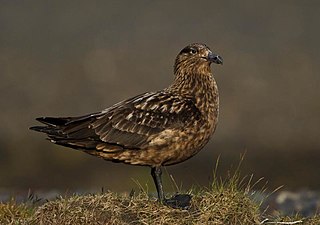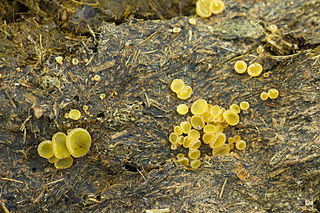
The skuas are a group of predatory seabirds with seven species forming the genus Stercorarius, the only genus in the family Stercorariidae. The three smaller skuas, the Arctic skua, the long-tailed skua, and the pomarine skua, are called jaegers in North American English.

The long-tailed skua or long-tailed jaeger is a seabird in the skua family Stercorariidae.

The parasitic jaeger or Arctic skua (Europe), is a seabird in the skua family Stercorariidae. It is a migratory species that breeds in Northern Scandinavia, Scotland, Iceland, Greenland, Northern Canada, Alaska, and Siberia and winters across the southern hemisphere. Kleptoparasitism is a major source of food for this species during migration and winter, and is where the name is derived from.

The pomarine jaeger, pomarine skua, or pomatorhine skua, is a seabird in the skua family Stercorariidae. It is a migrant, wintering at sea in the tropical oceans.

The great skua, sometimes known by the name bonxie in Britain, is a large seabird in the skua family Stercorariidae. It is roughly the size of a herring gull. It mainly eats fish caught at the sea surface or taken from other birds.

The south polar skua is a large seabird in the skua family, Stercorariidae. An older name for the bird is MacCormick's skua, after explorer and naval surgeon Robert McCormick, who first collected the type specimen. This species and the other large skuas, such as the great skua, are sometimes placed in a separate genus Catharacta.

The brown skua, also known as the Antarctic skua, subantarctic skua, southern great skua, southern skua, or hākoakoa (Māori), is a large seabird that breeds in the subantarctic and Antarctic zones and moves further north when not breeding. Its taxonomy is highly complex and a matter of dispute, with some splitting it into two or three species: Falkland skua, Tristan skua, and subantarctic skua. To further confuse, it hybridizes with both the south polar and Chilean skuas, and the entire group has been considered to be a subspecies of the great skua, a species otherwise restricted to the Northern Hemisphere.
This is a list of the fauna of Finland. Finland borders Sweden to the west, Russia to the east, and Norway to the north, while Estonia lies to its south across the Gulf of Finland, allowing an ecological mix. Finland contains many species of mammals, birds, and fish, but only a few reptiles and amphibians. This article discusses all the vertebrate animals which can be found on Finland itself, not the oceans.

The Ascobolaceae are a family of fungi in the order Pezizales. A 2008 estimate places 6 genera and 129 species in the family.

Ascobolus is a genus of fungi in the Ascobolaceae family. The genus has a widespread distribution, and contains an estimated 61 species, most of which are coprophilous. The genus was circumscribed by Christian Hendrik Persoon in 1796.

Ascobolus carbonarius is a species of apothecial fungus belonging to the family Ascobolaceae.
Ascobolus brassicae is a species of apothecial fungus belonging to the family Ascobolaceae.

Photolateralis stercorarius, the oblong slipmouth, is a marine ray-finned fish, a ponyfish from the family Leiognathidae. It has been recorded from Indonesia, Philippines, New Guinea, Guam and Tonga in the western Pacific Ocean. It lives on inner reef flats and in silt-laden inshore waters at depths greater than 20 metres (66 ft). It attains a maximum recorded total length of 10.2 centimetres (4.0 in). It was first formally described in 1907 as known as Leiognathus stercorarius by the American ichthyologists Barton Warren Evermann (1853-1932) and Alvin Seale (1871-1958) with the type locality given as Bulan, Sorsogon in the Philippines. It was more recently named as Equulites stercorarius, but was re-evaluated in 2015 as part of Photolateralis. It is the type species of the genus Photolateralis.
Ascobolus immersus is a species of fungus belonging to the family Ascobolaceae.
Ascobolus brantophilus is a species of coprophilous fungus in the family Ascobolaceae. It grows on goose droppings.








